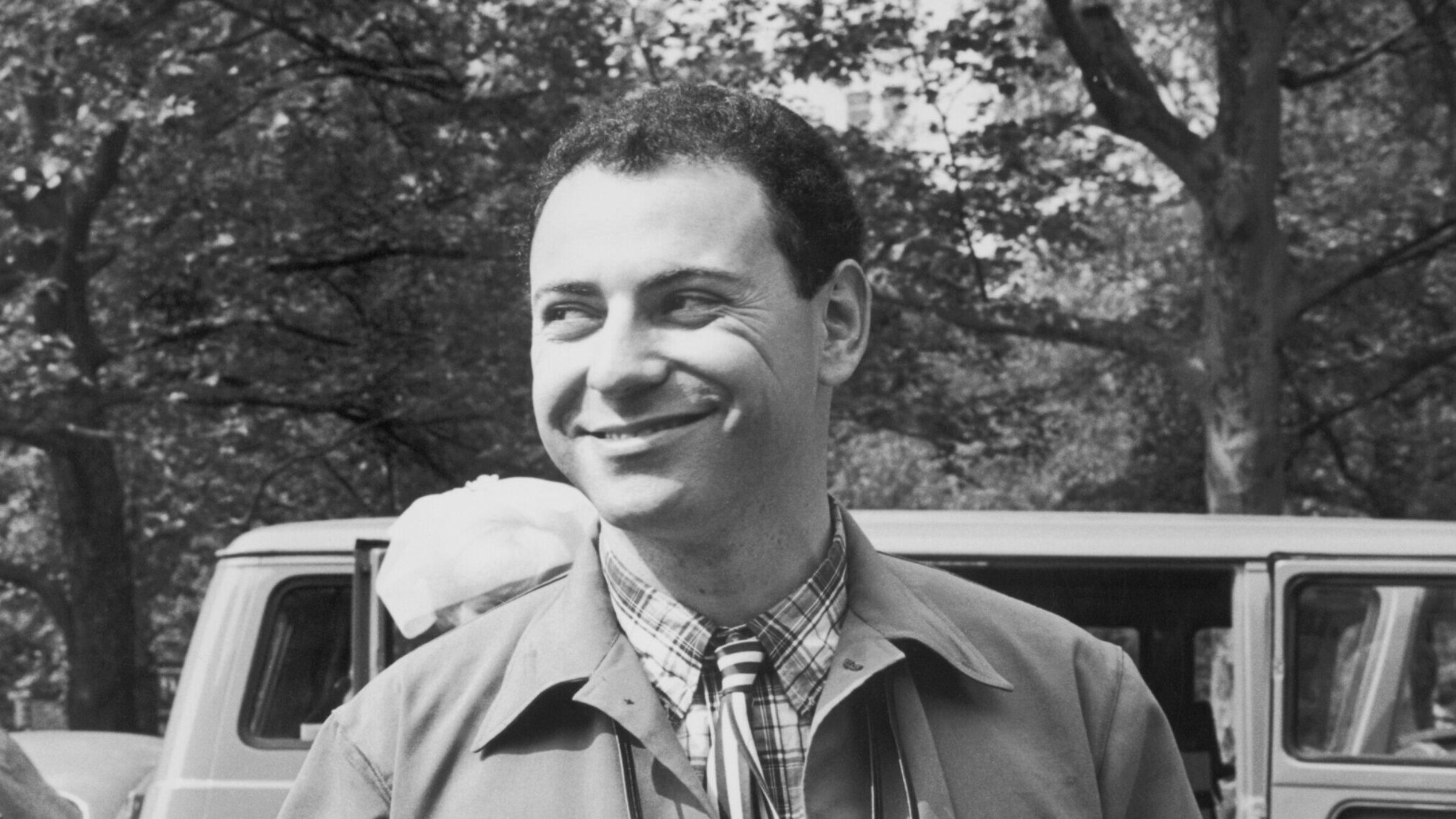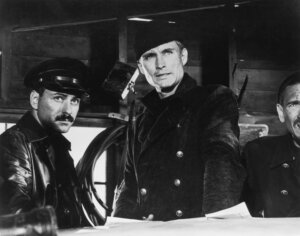After a serpentine life of spiritual seeking, Alan Arkin discovered his soul in Jewish characters
The Oscar-winning actor tried on French, Jamaican and Puerto Rican accents before he found his true voice

Alan Arkin in a scene from ‘The Love Song of Barney Kempinski,’ circa 1967. Photo by Getty Images
The Oscar-winning actor Alan Wolf Arkin, who died June 29 at age 89, spent decades trying to replace lost Yiddishkeit with personal spirituality and professional ethnicities.
Born in Brooklyn to lefties of Ukrainian, Russian and German Jewish origin, Arkin informed the authors of American Jewish Filmmakers that his Jewish background was “scant” and lack of religious training meant that Judaism played “little part in [his] conscious life.”
Perhaps unconsciously, formative studies on the West Coast with Benjamin Zemach, a Polish dancer and choreographer who specialized in Jewish themes, may have replaced an absence of domestic ritual. Zemach, who had also coached the actors Lee J. Cobb and Sam Jaffe, guided Arkin to psychologically adept approaches to acting.
So Arkin was prepared when cast as David Kolowitz, an aspiring actor in 1963’s Enter Laughing, a play by Joseph Stein, based on a novel by Carl Reiner.
Arkin’s incarnation of a talentless histrionic schmendrick won him fame. Yet a parallel quest to compensate for an absence of overt Jewish content in his personal life may have led him to far-fetched consolations, as detailed in a 2020 memoir.
For over two decades he associated with John Battista, a former actor who headed an Agni Yoga ashram in upstate New York. In 1993, Battista was charged with molesting three female disciples, earning the sobriquet the Creep Guru in the popular press.
Arkin also had a lasting fascination with a Brazilian faith healer known as Zé Arigó, who dabbled in so-called psychic surgery, a pseudoscientific medical fraud in which practitioners pretend to perform surgery with their bare hands or kitchen implements.
Seeking healing for a youth spent with undemonstrative parents, Arkin was easy prey for this type of mishegas long before his arrival in La La Land. The American Jewish novelist Nathanael West (born Nathan Weinstein) deemed California a mecca for bizarre cult worshipers.
In an 1984 reminiscence, Halfway Through the Door, Arkin recounted how in a previous life during the French Revolution, he was guillotined.
Arkin’s resonant baritone voice, Brooklyn talking tachlis style, and masculine gravity retained plausibility, unlike other thespian proponents of reincarnation. He also delved into the writings of the Indian Hindu monk Paramahansa Yogananda. This spiritual guide’s piety, as presented by a disciple, Swami Anandamoy, claimed to liken yoga to the story of Moses in the Jewish Bible.
Long struggling with unemployment, like his impoverished parents who were accused of Communism during the McCarthy era, Arkin’s temporary solution was to establish a folk singing ensemble, The Tarriers.
He copyrighted a medley of two traditional Jamaican folk tunes that the group recorded as “The Banana Boat Song.” Sarah Vaughan, Steve Lawrence and Shirley Bassey later recorded their arrangement.
Simultaneously, the Jamaican American singer Harry Belafonte released his own version of “Day-O (The Banana Boat Song)” inspired by earlier Trinidadian and Jamaican recordings.
Although Arkin would later joke to The Independent that he and Belafonte “both stole from Jamaica” the income-earning hit, Arkin sang it with an ersatz Jamaican accent in Calypso Heat Wave, his 1957 film debut, in a manner teetering on blackface.
This cultural appropriation would continue as a personal and professional quest for ethnicity lost when his family essentially set aside their Jewish origins. Without the conventional looks of a 1960s and 70s Hollywood leading man, Arkin was typecast in ethnic roles.
These he assumed with deep seriousness, sometimes recalling the dignity with which Paul Muni, a former Yiddish theater star, would turn up onscreen as a Chinese farmer or Italian mobster.
Although indigestible for today’s more ethnically sensitive audiences, Arkin’s more plausible efforts retain value. One such was as Abraham Rodriguez, a Puerto Rican widower raising two sons in Spanish Harlem in Popi (1969).

Generally, Arkin’s extended toil in showbiz Jewish generic ethnic purgatorio was comparable to that of his friend and colleague Eli Wallach; they starred together on Broadway in Murray Schisgal’s play Luv.
In 1968, Arkin was hired to replace an otherwise engaged Peter Sellers in a pallid screen version of Inspector Clouseau directed by Bud Yorkin. Arkin managed the assignment, possibly by channeling his boyhood idol Danny Kaye.
The most egregious of such exotica was 1974’s Freebie and the Bean, a violent, homophobic, transphobic, and racist shanda costarring James Caan.
Always hyper-aware of his faux pas, Arkin felt that despite his veneration of the writings of Joseph Heller, his performance in Mike Nichols’ film of Heller’s Catch-22 as John Yossarian, a U.S. soldier in World War II with Assyrian and Armenian heritage, was subpar.
Early life and career tensions were expressed in Arkin’s directorial debut, a cinematic version of Jules Feiffer’s Little Murders (1971) about New York violence. It included virtuoso acting turns by skilled performers such as John Randolph (born Emanuel Hirsch Cohen) and Elliott Gould.
As an actor, Arkin’s weighty angst was too intensely scary for the Neil Simon repertoire. A grating turn as Barney Cashman in Simon’s Last of the Red Hot Lovers (1972) proved that. Yet as stage director for the original Broadway production that same year of Simon’s The Sunshine Boys starring Jack Albertson and Sam Levene, Arkin revealed the explosive hostility barely restrained behind the playwright’s surface bonhomie.
As Arkin aged, a possibly inadvertent mellowing occurred, and a penchant for screaming at film directors was abandoned. So as Reuben Shapiro, the patriarch in the Canadian Jewish author Mordecai Richler’s semi-autobiographical novel Joshua Then and Now (1985), Arkin delivered a beatific performance.
And as the salesman George Aaronow in 1992’s Glengarry Glen Ross, Arkin brought a welcome touch of reality to the overwrought diva-like schreis in David Mamet’s opus.
Arkin’s turn as a foul-mouthed grandfather in Little Miss Sunshine in 2006 won him an Academy Award. And he portrayed Leon Felhendler, a real-life rabbi’s son and Polish resistance fighter in Escape from Sobibor (1987).
Ever-ready to put his head in the lion’s mouth, metaphorically speaking, for enlightenment’s sake, Arkin had sought out an acquaintanceship with the fearsome hermit and American Jewish literary legend J.D. Salinger. He even visited Salinger in his New Hampshire home.
So Arkin naturally relished voicing the role of Salinger in the Netflix animated series BoJack Horseman, an entertainment industry tragicomedy.
Later, he also played Norman Newlander, a Hollywood agent in the series The Kominsky Method alongside Michael Douglas as the eponymous protagonist, an actor-turned-performance coach. Arkin himself did extensive real-life coaching, conveying teachings acquired from decades of seeking personal guidance.
It was as if after a prolonged stint as a jittery yeshiva bocher, Alan Arkin had at last arrived at the status of rabbi.






















